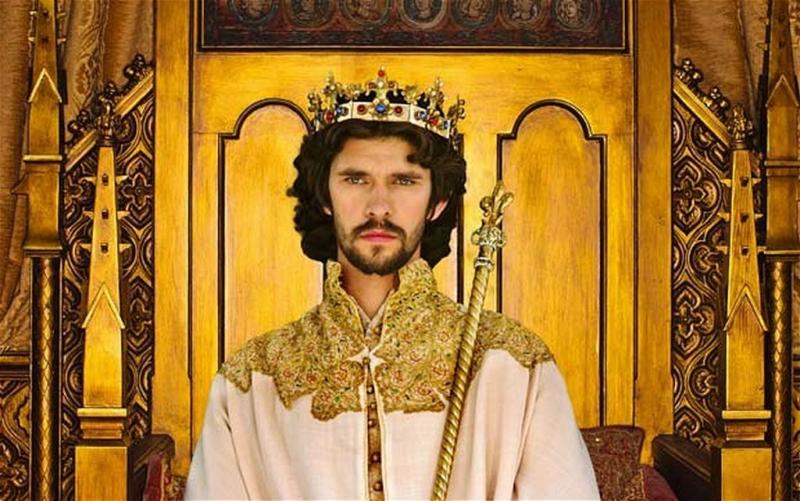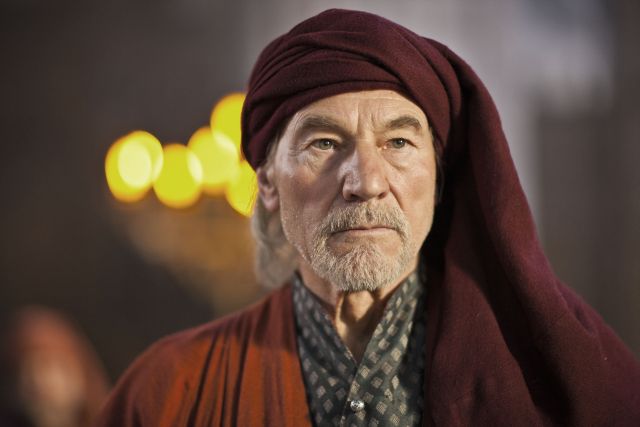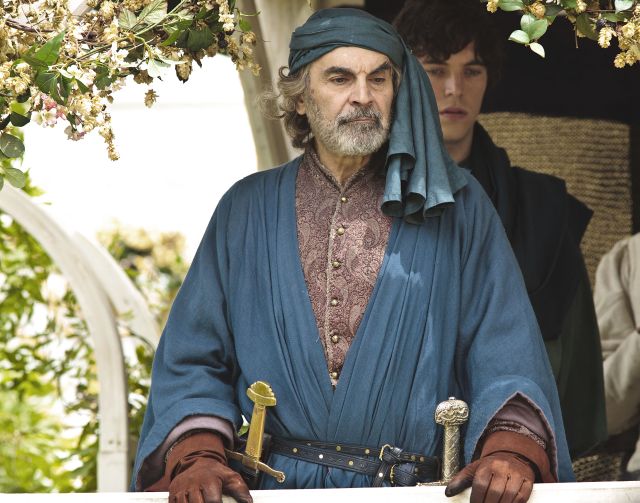The Hollow Crown: Richard II, BBC Two | reviews, news & interviews
The Hollow Crown: Richard II, BBC Two
The Hollow Crown: Richard II, BBC Two
Shakespeare's ravishing history play all tressed up in transfer to TV

There was some pretty serious hair on view in the BBC's new film of Richard II, a play better-known for its luxuriant verse, and well there might be, given that the adaptation came to us courtesy that most fulsomely-maned of theatre directors, Rupert Goold.
The answer is yes in some places and not so well in others, but I can't imagine not being mesmerised by the overabundance of tresses on view. Leading man Ben Whishaw was one thing but who knew that David Suchet and Patrick Stewart took so splendidly to long, flowing locks?
Goold's film, adapted with his longtime colleague Ben Power from the Bard's ceaselessly rhapsodic text, inaugurates a celluloid cycle of history plays under a larger banner title, Shakespeare Unlocked, that forms part of the Cultural Olympiad. Still to come in a subset of offerings known as The Hollow Crown are Richard Eyre directing Simon Russell Beale as Falstaff in the two Henry IV plays and Thea Sharrock putting Tom Hiddleston through his paces in Henry V, the Shakespeare play of the moment. And yet, Richard II poses arguably the greatest cinematic challenge of the lot, dependent as it is on soaring verbal arias that can transfix audiences in the playhouse but are trickier to navigate on screen, not least by contrast with the carousing and military derring-do that course through the sequence of Henry plays.
 Goold's approach to some extent can be seen as ironic, not least when one considers the mixed-media bravado that he has brought to such stage productions as Macbeth (with Stewart in the title role) and, preeminently, Six Characters in Search of an Author, still this prolific talent's finest achievement to date. Marked out by a belligerent naturalism entirely lacking in the interpretive leaps to which Goold has been prone on stage - an RSC Merchant of Venice, for instance, set in Las Vegas - this Richard had the perverse effect of containing very little of visual interest. In which case, thank heavens for the follicular splendour - and the words. (Some will have warmed more than I did to the intermittent presence of a pet monkey.)
Goold's approach to some extent can be seen as ironic, not least when one considers the mixed-media bravado that he has brought to such stage productions as Macbeth (with Stewart in the title role) and, preeminently, Six Characters in Search of an Author, still this prolific talent's finest achievement to date. Marked out by a belligerent naturalism entirely lacking in the interpretive leaps to which Goold has been prone on stage - an RSC Merchant of Venice, for instance, set in Las Vegas - this Richard had the perverse effect of containing very little of visual interest. In which case, thank heavens for the follicular splendour - and the words. (Some will have warmed more than I did to the intermittent presence of a pet monkey.)
Whishaw has long seemed a Richard II-in-waiting, the actor's fey, doe-eyed androgyny wedded to a command of classical text that can make its untrammelled way through one or another spoken set piece. And first seen eyes fluttering, flashing a thin, coquettish smile that could dismiss onlookers as readily as it drew them near, Whishaw immediately communicated the divinely anointed manchild who, after all, was only 10 when he acceded to the throne. His cavalier "so much for that" upon the passing of Stewart's baleful John of Gaunt (pictured above) made clear early on that death doesn't seem particularly to register to a ruler who comes to discover humanity at the price of his crown; it takes Richard's surrender of authority for him to acquire a soul.
 So perhaps it was inevitable that for all the visual attention paid to thrones, castles, and water (that last element a leitmotif of the text itself), Goold favoured the close-up in a somewhat monotonous attempt to burrow into this baleful king's anguished if newly awakened psyche. I've never seen a Richard on stage whose faux-narcissistic admission, "no deeper wrinkles yet", was so fully borne out, the result here of a camera busily zooming in for the facial kill well before Tom Hughes's full-lipped, smooth-cheeked Aumerle - no beard for him! - came along to administer the fatal blow. The intimacy also made possible a whispery intensity that wouldn't wash in the playhouse, where you'd never be heard beyond the second row.
So perhaps it was inevitable that for all the visual attention paid to thrones, castles, and water (that last element a leitmotif of the text itself), Goold favoured the close-up in a somewhat monotonous attempt to burrow into this baleful king's anguished if newly awakened psyche. I've never seen a Richard on stage whose faux-narcissistic admission, "no deeper wrinkles yet", was so fully borne out, the result here of a camera busily zooming in for the facial kill well before Tom Hughes's full-lipped, smooth-cheeked Aumerle - no beard for him! - came along to administer the fatal blow. The intimacy also made possible a whispery intensity that wouldn't wash in the playhouse, where you'd never be heard beyond the second row.
The result, oddly, was to sideline the Bolingbroke of Rory Kinnear, who seemed to spend much of the time not speaking, head cocked to one side. (On the other hand, theatre buffs will doubtless have thrilled to the mano a mano presence of two such vaunted stage Hamlets.) Far more impressive in smaller parts were Suchet as a steely Duke of York (pictured above, with Hughes behind) who appeared to have wandered in from a nearby casbah (the actor has a field day with the adjective "plume-plucked") and Lindsay Duncan as Suchet's determinedly maternal wife, who on this evidence must surely some day play Volumnia.
Playing a woman of stature transformed by parental solicitude into a "beggar" on behalf of Aumerle, her errant son, Duncan brought a touch of thespian majesty to a story of kingship laid low. And she served to remind us that Shakespeare's interest in regime change notwithstanding, he's pretty peerless when it comes to matters pertaining to family. And that in a history play cycle defined more or less entirely by men, the ladies get their moment, too.
Explore topics
Share this article
Add comment
The future of Arts Journalism
You can stop theartsdesk.com closing!
We urgently need financing to survive. Our fundraising drive has thus far raised £49,000 but we need to reach £100,000 or we will be forced to close. Please contribute here: https://gofund.me/c3f6033d
And if you can forward this information to anyone who might assist, we’d be grateful.

Subscribe to theartsdesk.com
Thank you for continuing to read our work on theartsdesk.com. For unlimited access to every article in its entirety, including our archive of more than 15,000 pieces, we're asking for £5 per month or £40 per year. We feel it's a very good deal, and hope you do too.
To take a subscription now simply click here.
And if you're looking for that extra gift for a friend or family member, why not treat them to a theartsdesk.com gift subscription?
more TV
 Hostage, Netflix review - entente not-too-cordiale
Suranne Jones and Julie Delpy cross swords in confused political drama
Hostage, Netflix review - entente not-too-cordiale
Suranne Jones and Julie Delpy cross swords in confused political drama
 In Flight, Channel 4 review - drugs, thugs and Bulgarian gangsters
Katherine Kelly's flight attendant is battling a sea of troubles
In Flight, Channel 4 review - drugs, thugs and Bulgarian gangsters
Katherine Kelly's flight attendant is battling a sea of troubles
 Alien: Earth, Disney+ review - was this interstellar journey really necessary?
Noah Hawley's lavish sci-fi series brings Ridley Scott's monster back home
Alien: Earth, Disney+ review - was this interstellar journey really necessary?
Noah Hawley's lavish sci-fi series brings Ridley Scott's monster back home
 The Count of Monte Cristo, U&Drama review - silly telly for the silly season
Umpteenth incarnation of the Alexandre Dumas novel is no better than it should be
The Count of Monte Cristo, U&Drama review - silly telly for the silly season
Umpteenth incarnation of the Alexandre Dumas novel is no better than it should be
 The Narrow Road to the Deep North, BBC One review - love, death and hell on the Burma railway
Richard Flanagan's prize-winning novel becomes a gruelling TV series
The Narrow Road to the Deep North, BBC One review - love, death and hell on the Burma railway
Richard Flanagan's prize-winning novel becomes a gruelling TV series
 The Waterfront, Netflix review - fish, drugs and rock'n'roll
Kevin Williamson's Carolinas crime saga makes addictive viewing
The Waterfront, Netflix review - fish, drugs and rock'n'roll
Kevin Williamson's Carolinas crime saga makes addictive viewing
 theartsdesk Q&A: writer and actor Mark Gatiss on 'Bookish'
The multi-talented performer ponders storytelling, crime and retiring to run a bookshop
theartsdesk Q&A: writer and actor Mark Gatiss on 'Bookish'
The multi-talented performer ponders storytelling, crime and retiring to run a bookshop
 Ballard, Prime Video review - there's something rotten in the LAPD
Persuasive dramatisation of Michael Connelly's female detective
Ballard, Prime Video review - there's something rotten in the LAPD
Persuasive dramatisation of Michael Connelly's female detective
 Bookish, U&Alibi review - sleuthing and skulduggery in a bomb-battered London
Mark Gatiss's crime drama mixes period atmosphere with crafty clues
Bookish, U&Alibi review - sleuthing and skulduggery in a bomb-battered London
Mark Gatiss's crime drama mixes period atmosphere with crafty clues
 Too Much, Netflix - a romcom that's oversexed, and over here
Lena Dunham's new series presents an England it's often hard to recognise
Too Much, Netflix - a romcom that's oversexed, and over here
Lena Dunham's new series presents an England it's often hard to recognise
 Insomnia, Channel 5 review - a chronicle of deaths foretold
Sarah Pinborough's psychological thriller is cluttered but compelling
Insomnia, Channel 5 review - a chronicle of deaths foretold
Sarah Pinborough's psychological thriller is cluttered but compelling
 Live Aid at 40: When Rock'n'Roll Took on the World, BBC Two review - how Bob Geldof led pop's battle against Ethiopian famine
When wackily-dressed pop stars banded together to give a little help to the helpless
Live Aid at 40: When Rock'n'Roll Took on the World, BBC Two review - how Bob Geldof led pop's battle against Ethiopian famine
When wackily-dressed pop stars banded together to give a little help to the helpless

Comments
I learned a lot from this new
Word for word the same
Word for word the same posting that you made (unless you misappropriated it) on the Telegraph website. I'm surprised that you consider such drivel worth repeating.
“This Richard had the
This version of Richard is
This must be the best
I have never seen such an
"Very little of visual
My family and I thoroughly
Cinematic versions of